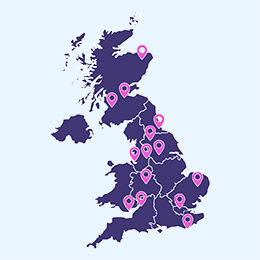- Licenced Business Rescue Experts
- Helping Directors in Debt
- Same Day Advice
For free expert advice, send us a message and we’ll be in touch

Table of Contents
- What is Creditors Voluntary Liquidation?
- How does the CVL process work?
- What are the impacts of a CVL on directors?
- How much does a CVL cost?
- What are the advantages of a CVL?
- What are the disadvantages of a CVL?
- How do I move forward with a CVL?
What is Creditors’ Voluntary Liquidation?
If your business is financially distressed and facing mounting creditor pressure, it is important that you seek immediate advice. This page will cover specific advice around a Creditors’ Voluntary Liquidation, also referred to as a CVL.
There are a number of solutions available, depending on your business and its current situation. However, if your business has limited assets and is not considered viable in its current form going forwards, then a CVL may be appropriate.
How does the CVL process work?
A CVL is lead by the directors and shareholders of the company, meaning that you will be able to choose the Liquidator that you wish to work with.
CVL enables the business to be wound down and closed properly, with all known creditors consulted by the Insolvency Practitioner before the company enters Liquidation, and throughout the process thereafter.
Once engaged, the proposed Liquidator will notify all creditors of a Decision Date, one that is convened typically 2-4 weeks from engagement. It is on this date that the company formally enters Liquidation; however, this initial notification and engagement with creditors serves to alleviate creditor pressure.
During this period, the proposed Liquidator will extract various information from you, and prepare a report and financial statement of affairs of the company, which is shared with creditors prior to the decision date.
Once appointed, the Liquidator’s role is to realise the company’s assets for the benefit of creditors. If you want to know more about the specific ways in which we look to realise assets during a Creditors’ Voluntary Liquidation, you can get in touch with us today and we’d be happy to talk you through your options.
In addition to the sale of any physical assets, the Liquidator will seek to collect in any monies due to the company. You will be afforded the opportunity to purchase any assets of the company you may wish to keep, should your intention be to start a new company.
What are the impacts of a CVL on Directors?
Contrary to common belief, entering Liquidation does not automatically prevent you from acting as a director in the future. Whilst there are restrictions regarding the re-use of the same or a similar company name, as long as certain acts are carried out by you, then this is still possible.
Our Insolvency Practitioners will provide you with all of the requisite advice in all matters related to the CVL process to ensure that you do not encounter any problems.
As a director of a company that enters Liquidation, your personal credit rating will also not automatically be affected, providing that it does not result in any unpaid amounts in respect of personal guarantees.
In addition to the above, any employees that are made redundant as part of the Liquidation process will be provided with the relevant guidance and assistance in respect of claiming any monies owed to them.
Any arrears of wages, holiday pay, pay in lieu of notice can be claimed from the Redundancy Payments Service, up to statutory limits. This process is overseen by the Liquidators, to ensure that any loss suffered by employees is recovered in a timely manner.
How much does a CVL cost?
The fees and expenses of the Creditors’ Voluntary Liquidation process are subject to approval, paid in priority to payments to creditors. In the majority of CVL processes, these fees will be met from the proceeds of asset realisation, and in these instances, there is no direct cost to the directors.
However, should your company have insufficient (or no) assets to cover the cost of a CVL, the fees will need to be met by the directors personally.
In this scenario, we will agree with you a fixed fee for dealing with the Liquidation, ensuring that there are no further, hidden costs added later on in the CVL process.
We will also help you explore the full scope of your available assets in order that the CVL process costs can be fully covered by existing assets wherever possible. One of our expert team will be able to take you through this in more detail.
What are the advantages of a CVL?
- You are able to nominate the Liquidator of your choosing;
- Option to purchase the company’s assets at fair value, should you wish to start a new company;
- Offers the ability to leave historic debts behind and often brings an end to pressure from banks and other creditors (including HMRC), as the insolvency practitioner deals with creditor queries;
- Ensures an orderly wind-down and closure of the company, should you wish to walk away;
- The Liquidator has the power to terminate any leases in the name of the company, should they no longer be required;
- Any employees terminated as a result of the Liquidation are able to submit claims to the Redundancy payments Service for any arrears of wages, redundancy pay etc;
- A quick and efficient way of bringing the company to a close.
- The process is driven by the directors who have more control in appointing an IP they are happy with;
- The sooner the decision is made to begin the process, the less the risk of wrongful trading.
What are the disadvantages of a CVL?
- The company will need to close down and stop trading immediately (there are alternative processes available if this is not what you want e.g. Administration or Company Voluntary Arrangement [CVA]);
- Any personal guarantees will crystallise;
- Director conduct will be investigated and action is potentially taken if inappropriate;
- The process can require a director contribution to costs if there are insufficient assets available.
How do I move forward with a CVL?
To find out more about the costs of a CVL, the timescales involved, or any other question related to whether a Creditors’ Voluntary Liquidation is right for you, please get in touch with us today. We are available by phone on 0300 303 8284, or alternatively, you can get in touch with us using our online contact form and we’ll get back in touch with you.


